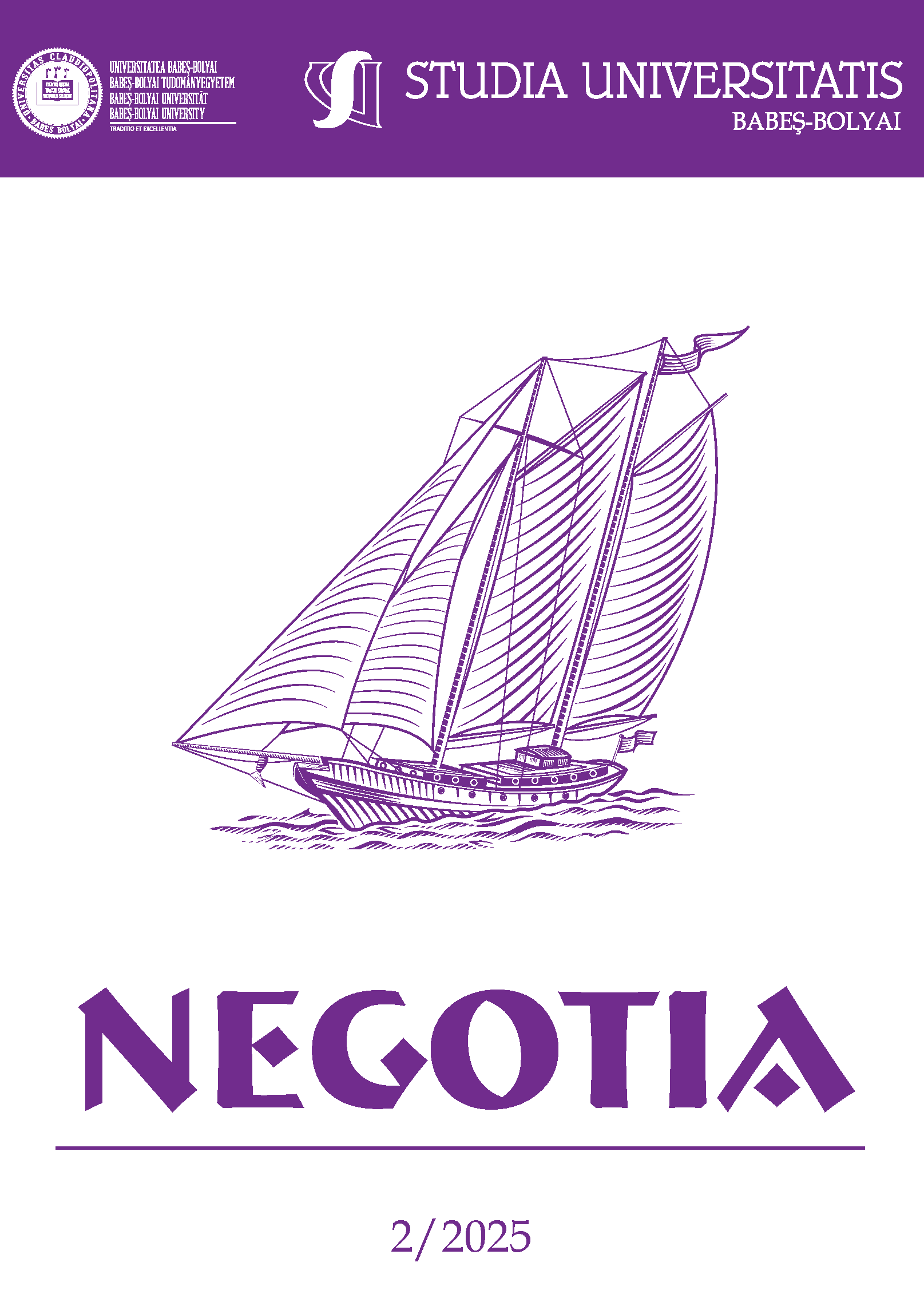THE IMPACT OF ARTIFICIAL INTELLIGENCE ON ROMANIA’S ECONOMY: SECTORAL IMPACTS, LABOR MARKET SHIFTS, AND FUTURE FORECASTS
DOI:
https://doi.org/10.24193/subbnegotia.2025.2.05Keywords:
Artificial Intelligence, labor market, productivity, economic sectorsAbstract
Modern technologies are continuously transforming the world, and Artificial Intelligence may be considered one of the most important discoveries of this century. The unknown nature of this technology, mixed with the rational and irrational fears of the vast majority, makes this research a must to give some order to the chaos created in the last few years. A concise and explicative explanation of Artificial Intelligence (AI) is given to understand the potential of this technology. Many workers perceive this technology as a threat, while their employers see it as an opportunity to cut costs. The main objective of this study is to identify the possible impact that the application of AI may have in the future, in Romania, in each economic sector (primary, secondary, and tertiary). This will lead to an in-depth analysis of the transition that AI will force on these sectors.
JEL classification: E24, J29, O39, L86
Article History: Received: 8 May 2025; Reviewed: 10 June 2025;
Accepted: 20 June 2025; Available online: 27 June 2025.
References
1. Acemoglu, D. & Restrepo, P. (2018). The race between man and machine: Implications of technology for growth, factor shares, and employment. American Economic Review, 108(6), 1488–1542. https://doi.org/10.1257/aer.20160696
2. Acemoglu, D. & Restrepo, P. (2019). Automation and new tasks: How technology displaces and reinstates labor, Journal of Economic Perspectives, 33(2), 3-30. https://doi.org/10.1257/jep.33.2.3
3. Boboc, A. (2022). Studiu ANIS: Piața IT din România a depășit valoarea de 9 miliarde de euro. Forbes, available at https://www.forbes.ro/studiu-anis-piata-it-din-romania-a-depasit-valoarea-de-9-miliarde-de-euro-298188
4. Cibian, S. & Dragan, M. (2022). A national study on digital inclusion and exclusion in Romania, available at https://icf-fri.org/wp-content/uploads/2022/12/Raport-Incluziune-digitala-en_compressed_final.pdf
5. Daramola, G.O., Jacks, B.S., Ajala, O.A. & Akinoso, A.E. (2024). Enhancing oil and gas exploration efficiency through ai-driven seismic imaging and data analysis, Engineering Science & Technology Journal, 5(4), 1473-1486. https://doi.org/10.51594/estj.v5i4.1077
6. European Commission, Directorate General for Economic and Financial Affairs (2025), “European Economic Forecast. Spring 2025”, Institutional paper 318/May 2025, ISSN 2443-8014, available at https://economy-finance.ec.europa.eu/document/download/e9de23c8-b161-40d0-9ad7-e04a25500023_en?filename=ip318_en.pdf
7. Eurostat (2024). Employment and social policy indicators, available at https://ec.europa.eu/eurostat/databrowser/explore/all/tb_eu?lang=en&subtheme=es.tesem&display=list&sort=category
8. Finance Talks (n.d.). Artificial intelligence in insurance and finance, IE University, available at https://financetalks.ie.edu/artificial-intelligence-in-insurance-and-finance/
9. Finio M. & Downie A. (2024). AI in software development, available at https://www.ibm.com/think/topics/ai-in-software-development
10. Gao, X. & Feng, H. (2023). AI-driven productivity gains: Artificial Intelligence and firm productivity. Sustainability 15(11), 8934. https://doi.org/10.3390/su15118934
11. Goedde, L., Katz, J., Ménard, A. & Revellat, J. (2020). Agriculture’s connected future: How technology can yield new growth. McKinsey and Company, available at https://www.mckinsey.com/~/media/McKinsey/Industries/Agriculture/Our%20Insights/Agricultures%20connected%20future%20How%20technology%20can%20yield%20new%20growth/Agricultures-connected-future-How-technology-can-yield-new-growth-F.pdf
12. IMF (2024). IMF Country Report No. 24/276. People’s Republic of China. Selected issues. available at https://www.imf.org/-/media/Files/Publications/CR/2024/English/1chnea2024004-print-pdf.ashx (accessed on May 14th, 2025).
13. INS (2024a). Grupurile de întreprinderi din România în anul 2022”, Comunicat de presa Nr. 107 / 29 aprilie 2024, available at https://insse.ro/cms/sites/default/files/com_presa/com_pdf/grup_intrep2022r.pdf
14. INS (2024b). Populaţia după domiciliu la 1 iulie 2024, available at: https://insse.ro/cms/ro/tags/comunicat-popula%C5%A3ia-dup%C4%83-domiciliu
15. IPSOS (2023). Românii și inteligența artificială - între ignoranță și fascinație, available at https://www.ipsos.com/ro-ro/romanii-si-inteligenta-artificiala-intre-ignoranta-si-fascinatie
16. Joshi, N. (2019). 7 Types Of Artificial Intelligence, available at https://www.forbes.com/sites/cognitiveworld/2019/06/19/7-types-of-artificial-intelligence
17. Li, L. (2022). Reskilling and upskilling the future-ready workforce for industry 4.0 and beyond. Information Systems Frontiers, 26, 1697–171. https://doi.org/10.1007/s10796-022-10308-y
18. Lloyds Bank (2025). Romania: economic and political overview, available at https://www.lloydsbanktrade.com/en/market-potential/romania/economical-context
19. Loukides, M., Lorica, B. (2016). What is Artificial Intelligence?, O’Reilly Media.
20. Marr, B. (2023). A Short History Of ChatGPT: How We Got To Where We Are Today, available at https://www.forbes.com/sites/bernardmarr/2023/05/19/a-short-history-of-chatgpt-how-we-got-to-where-we-are-today/
21. OECD (2023), “OECD Employment Outlook 2023: Artificial Intelligence and the Labour Market”, available at https://www.oecd.org/en/publications/oecd-employment-outlook-2023_08785bba-en/full-report.html
22. O’Neill, A. (2024). Romania: Distribution of employment by economic sector from 2012 to 2022, available at Statista: https://www.statista.com/statistics/373210/employment-by-economic-sector-in-romania/
23. O’Neill, A. (2025a). The 20 countries with the highest population decline rate in 2024, available at https://www.statista.com/statistics/264689/countries-with-the-highest-population-decline-rate/
24. O’Neill, A. (2025b). Total population in Romania from 1980 to 2030, available at https://www.statista.com/statistics/373119/total-population-of-romania/
25. PWC (2024). PwC’s workforce hopes and fears. Romania Survey 2024, available at https://www.pwc.ro/en/publications/Raport-Workforce-Hopes-and-Fears-Romania-2024.pdf
26. RBI (2022). Analiza distribuției companiilor din România la nivel de macroregiuni, în funcție de numărul de salariați și cifra de afaceri, available at https://rbi.ase.ro/distributia-companiilor-romanesti
27. Rout, B., Swain, S.C., Sarangi, P., Agrawalla, R. & Dash, S.R. (2024). A part of AI-actuated systems in developing analysis and experiments in various sectors and producing innovative products. 2024 4th International Conference on Advance Computing and Innovative Technologies in Engineering (ICACITE), Greater Noida, India, 815-819. https://doi.org/10.1109/ICACITE60783.2024.10616560
28. Russell, S. J. & Norvig, P. (2021). Artificial intelligence: a modern approach, Forth Edition, Pearson.
29. Schwab, K. (2024). The Fourth Industrial Revolution: what it means, how to respond. In Simsek, Z., Heavey, C., & Fox, B. C. (Eds.). Handbook of Research on Strategic Leadership in the Fourth Industrial Revolution. 26-34 Edward Elgar Publishing. https://doi.org/10.4337/9781802208818
30. Sharda, R., Delen, D. & Turban, E. (2021). Analytics, Data Science, & Artificial Intelligence: Systems for Decision Support. Pearson.
31. World Bank Group (n. d.), available at https://data.worldbank.org/country/romania?view=chart
32. World Economic Forum (2025), Future of Jobs Report 2025, available at https://reports.weforum.org/docs/WEF_Future_of_Jobs_Report_2025.pdf.
Downloads
Published
How to Cite
Issue
Section
License
Copyright (c) 2025 Studia Universitatis Babeș-Bolyai Negotia

This work is licensed under a Creative Commons Attribution-NonCommercial-NoDerivatives 4.0 International License.



